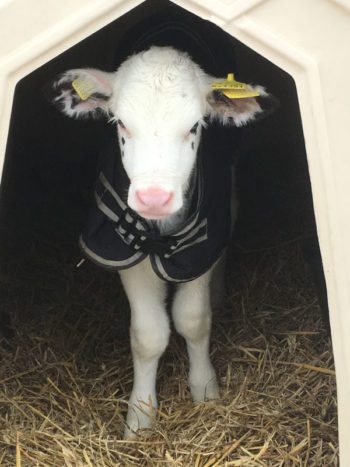27 Jan 2023
Researchers are launching a study to determine and benchmark individual and herd-level passive transfer status across herds, with aim of providing largest information to date.

Vet practices are being sought to enrol on the latest study to date to determine and benchmark individual and herd-level passive transfer status across UK dairy herds.
Researchers at the RVC are involved in the first study to examine the issue from a UK-wide perspective, and hope it will provide a large volume of information and data to help inform future best practice for farmers and vets.
Colostrum – essential for maternally derived antibodies in newborn calves – happens through passive transfer, when neonatal calves gain a degree of immune protection in the early stages of their lives.
 But prevalence of failure of passive transfer at individual calf level remains high, according to studies carried out in southern England and Scotland.
But prevalence of failure of passive transfer at individual calf level remains high, according to studies carried out in southern England and Scotland.
However, existing studies are limited to a relatively low number of farms, making extrapolation to a national context difficult.
PhD student George Lindley is leading the study, which will harvest and compile prospective total protein data routinely collected by practitioners from calves aged one to seven days. Combined with a brief questionnaire, the data will be used to determine how farmers are managing the harvesting, storage and feeding of colostrum.
The study will assess breed and gender differences, and aims to ascertain achievability of newly proposed thresholds for measurement of failure of passive transfer.
Practices participating in the study will need to gain farmer consent prior to routine serum total protein sampling, and be required to record and store results of any analysis alongside records of calf age, gender, breed and farm. The questionnaires take around 20 minutes and must be completed by any farm.
Mr Lindley said the study was open to all veterinary practices in England, Scotland, Wales and Northern Ireland, and runs until October 2023.
He said: “There is a wealth of information being collected routinely by farm vets regarding passive transfer which, if compiled, may provide helpful information regarding the health and welfare of calves born on dairy farms within the UK.
“During this study, we hope to harvest that data in a way that adds little extra work to vets and practices involved, but provides useful information for stakeholders and the industry as a whole.”
The project has been funded by the Barham Benevolent Foundation, with results expected in early 2024. For further information, email [email protected]